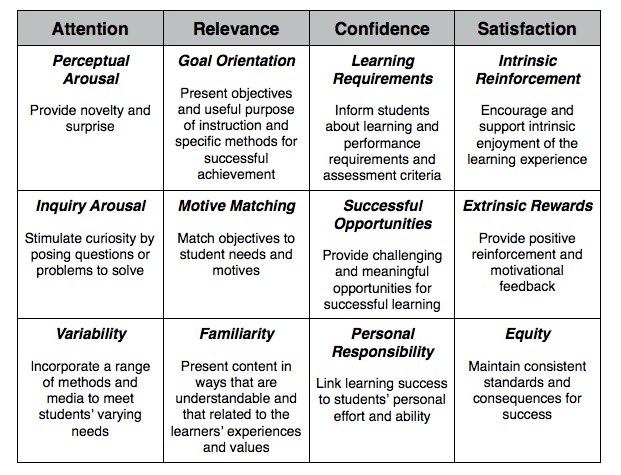Motivational Theory and Design - ARCS Model by Keller
Motivational Theory and Design
As educators student engagement is often the hot topic of discussion, we therefore need to be able to effectively examine and discuss one of the hidden drivers of engagement - that of motivation.
Motivation can be defined as measure of the individual effort a person is willing to exert in pursuit of a goal. When seen in this light you can see why motivation is often seen by educational designers and teachers as the keystone of successful learning.
The ARCS model by John Keller provides a framework suitable for teachers, students and academics to - examine, discuss and develop, implement and assess engaging learning solutions.
The ARCS model is more than a taxonomy and provides a systematic motivational design process which logically progresses from a learner centred situational analysis to a solution design.
The ARCS model is a problem solving approach to designing the motivational aspects of learning environments to stimulate and sustain students’ motivation to learn. There are two major parts to the model. The first is a set of categories representing the components of motivation. These categories are the result of a synthesis of the research on human motivation. The second part of the model is a systematic design process that assists you in creating motivational enhancements that are appropriate for a given set of learners. The synthesis allows you to identify the various elements of student motivation, and the design process helps you profile the motivational characteristics of students in a given learning environment and then design motivational tactics that are appropriate for them. (John Keller)
Retrieved from http://www.arcsmodel.com

Keller's - ARCS Model - Linked from https://julietausend.files.wordpress.com/2013/07/arcs_model_components_table.jpg
For more online information on John Keller's ARCS Model
Please explore the following links:
What is Motivational Design
http://www.arcsmodel.com/#!motivational-design/c2275
ARCS Model
http://www.arcsmodel.com/#!arcs-model/c1wm1
ARCS Categories
http://www.arcsmodel.com/#!arcs-categories/c1zqp
ARCS Design Process
http://www.arcsmodel.com/#!arcs-design-process/cvbe
Further Reading
Keller, J. M. (2010). Motivational design for learning and performance: The ARCS model approach. New York: Springer.
Keller, J. M. (2008). An integrative theory of motivation, volition, and performance.Technology, Instruction, Cognition, and Learning, 6, 79-104.
Keller, J. M. (1999). Motivation in cyber learning environments. Educational Technology International, 1(1), 7 – 30.
Keller, J. M. (1987). The systematic process of motivational design. Performance & Instruction, 26(9), 1-8.
Keller, J. M. (1987). Development and use of the ARCS model of motivational design.Journal of Instructional Development, 10(3), 2 – 10.
Keller, J. M. (1987). Strategies for stimulating the motivation to learn. Performance & Instruction, 26(8), 1-7.